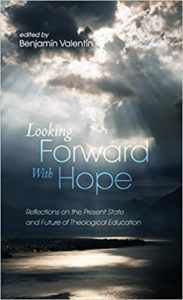The book is a compilation of chapters on a variety of aspects of theological education that present challenges with a view of how to move towards hope. Each chapter is written by a separate author who brings a serious analysis and discussion of the implications of that analysis for a broader and different vision for theological education for the future. For those currently in theological education as professors or administrators, or those preparing to enter, this book provides an important set of dimensions to consider as they seek to bring their varied contributions to these institutions of higher learning.
Among the topics examined are the population shifts in the United States, the changes in the culture and higher education and the growing role of the technology. Each chapter is brief in its analysis but well informed and, like a watercolor painting, adds new levels of detail and hue to the understanding the reader gains after reading the entirety of the book. Some of the chapters include examples of schools or other institutions that have transformed their mission, constituency, and operations. These help the reader reflect on their own practices and get a picture of what is involved in making a shift of their vision and scheme of operations that is grounded in their hope for a future rather than a reaction to the fear of extinction.
Benjamín Valentín’s edited volume on the future of theological education is a realistic and analytic view of the current state of theological education with real possibilities to be explored for the future. His own essay in the book, “Embracing a Greater, Higher Calling: Redefining the Mission and Purpose of the Freestanding Protestant Seminary,” takes the reader beyond the traditional understanding of the purpose of theology and the mission of a seminary of training for church professions to “the fostering of other ‘professions’ and pursuits aimed at the search for transcendence and the building of a more sacred compassionate, just and peaceful world.” (46) This is key for the Latinx community since our younger population will also be the most educated generation to date and their faith quest will need to include an interdisciplinary dialogue. Such dialogue facilitates an understanding of professional calling in arenas of work and society other than the church. There is also a need for a deeper conversation about stewardship that includes ecological aspects of the care of creation and what to do with the newly-acquired wealth their parents never had access to. What values will inform these lifestyles?
Hope is not built on theory. The book offers the stories of schools that demonstrate “methodologies of change and creative collaboration.” (92) Redefinitions of theology as religious praxis rather than religious science (95) and instances of critical pedagogies are described. The greatest challenge facing theological education, that of racism, is pointedly named by Willie Jennings in a chapter that confronts us very succinctly to “envisage formation that cross-pollinates and interpenetrates spiritual visions so that all students are invited into a truly shared project of cultivation that is now assimilation into a white norm. (136)
What the book does not offer is the mention or even the possibility of a dialogue with institutions of non-traditional theological education. I would suggest these institutions, once considered non-important and not serious places of ministerial formation, have expanded and proven to be places where some of the insights and practices named by the authors are already lived out. Collaborative projects are taking place and bringing hopes not imagined to both traditional and non-traditional institutions of theological education. It would have opened up the conversation and possibilities of hope to have included those thought to be on the margins. This would have modeled a change in theological education, thus breaking out of its definitions of theological education as only institutions of the privileged.
Overall, the chapters offer an honest and no-frills critique of theological education as it now exists alongside practices that can make a difference at this time. The practices of hope are built upon a foundation of analysis and critique that may guide readers to have further and systematic dialogue with communities who are serious about addressing these matters.
Association of Hispanic Theological Education




